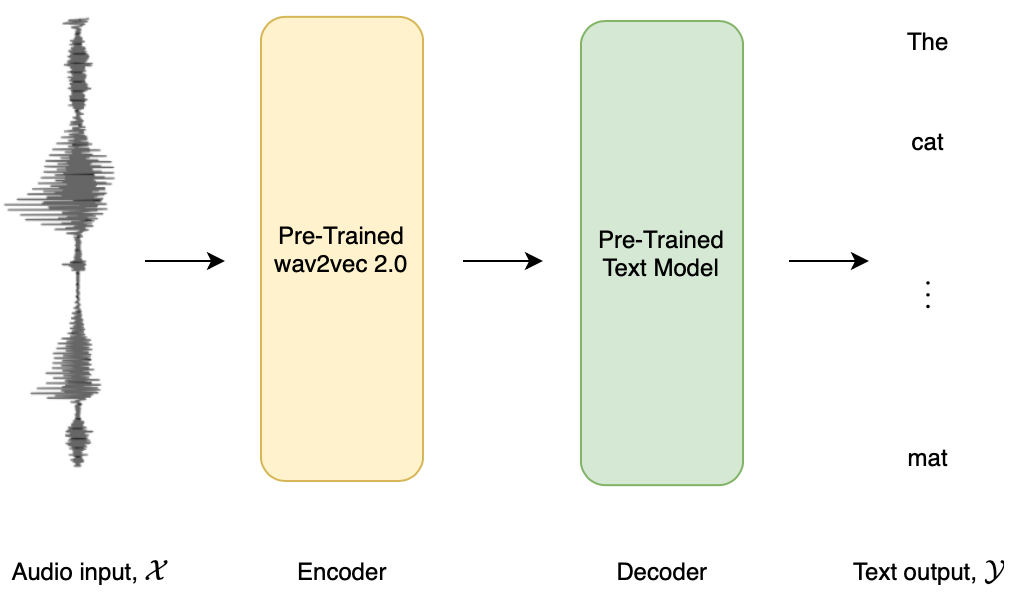A JAX/Flax repository for combining a pre-trained speech encoder model (e.g. Wav2Vec2, HuBERT, WavLM) with a pre-trained text decoder model (e.g. GPT2, Bart) to yield a Speech Sequence-to-Sequence (Seq2Seq) model for automatic speech recognition.
The script run_flax_speech_recognition_seq2seq.py can be used to fine-tune a Speech Seq2Seq model on one of the official speech recognition datasets or a custom dataset. It makes use of the pmap JAX operator to provide model parallelism accross GPU/TPU devices.
The modelling files are based very heavily on those from Hugging Face Transformers 🤗. This is a standalone repository to enable rapid prototyping and involvement with the community. The final modelling files and training script will be merged into Transformers 🤗 to be used with the rest of the open-source library. The final system weights will be made publicly available at huggingface.co 🚀
 Figure 1: Speech-encoder text-decoder style Seq2Seq model.
Figure 1: Speech-encoder text-decoder style Seq2Seq model.
To instantiate a Wav2Vec2-2-Bart model with the FlaxSpeechEncoderDecoderModel framework, run the following Python script inside the cloned repo:
from transformers import AutoFeatureExtractor, AutoTokenizer
from models.modeling_flax_speech_encoder_decoder import FlaxSpeechEncoderDecoderModel
import numpy as np
# checkpoints to leverage
encoder_id = "facebook/wav2vec2-large-lv60"
decoder_id = "facebook/bart-large"
model = FlaxSpeechEncoderDecoderModel.from_encoder_decoder_pretrained(
encoder_id, decoder_id, encoder_add_adapter=True, decoder_from_pt=True)
model.config.decoder_start_token_id = model.config.decoder.bos_token_id
model.config.pad_token_id = model.config.decoder.pad_token_id
model.config.eos_token_id = model.config.decoder.eos_token_id
model.config.use_cache = False
model.config.processor_class = "Wav2Vec2Processor"
# check if generation works
out = model.generate(np.ones((1, 2000)))
model.save_pretrained("./")
feature_extractor = AutoFeatureExtractor.from_pretrained(encoder_id)
feature_extractor.save_pretrained("./")
tokenizer = AutoTokenizer.from_pretrained(decoder_id)
tokenizer.save_pretrained("./")To train the model on Librispeech ASR in default precision, run the bash script provided below:
#!/usr/bin/env bash
python run_flax_speech_recognition_seq2seq.py \
--dataset_name="librispeech_asr" \
--model_name_or_path="./" \
--dataset_config_name="clean" \
--train_split_name="train.100" \
--eval_split_name="validation" \
--output_dir="./" \
--preprocessing_num_workers="16" \
--length_column_name="input_length" \
--overwrite_output_dir \
--num_train_epochs="5" \
--per_device_train_batch_size="2" \
--per_device_eval_batch_size="2" \
--gradient_accumulation_steps="1" \
--logging_steps="25" \
--max_duration_in_seconds="15" \
--max_target_length="128" \
--generation_max_length="40" \
--generation_num_beams="1" \
--learning_rate="1e-4" \
--warmup_steps="500" \
--text_column_name="text" \
--save_total_limit="1" \
--freeze_feature_encoder \
--predict_with_generate \
--do_lower_case \
--do_eval \
--do_train